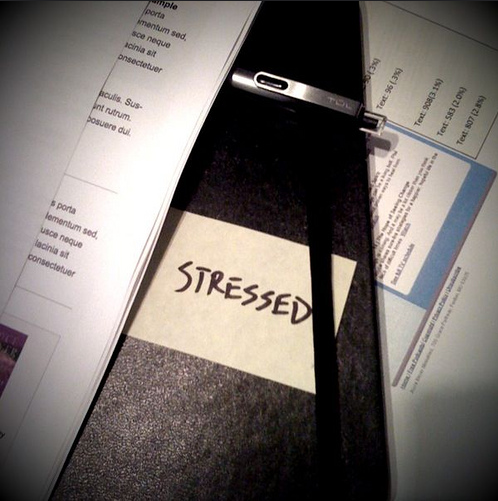Stress prescribed to our generation and how the youth deals with it

User Dan McCullough via Flickr, Creative Commons
Students are experiencing higher and higher amounts of stress as rigor increases and as colleges become more competitive.
“I wish I had the focus to study for this test, not to mention the essay I have coming up. It’s all so much, you know?”
“Oh yeah, I definitely understand that. If you need any help go ahead and let me know.”
“Well… you see, I haven’t gotten my diagnosis back, so I won’t get my prescription for a while…”
“If you needed, I could lend you some of my Adderall. I know how hard it is to finish strong.”
Self-Medication, What Is It?
Self-medication is the human tendency to abuse drugs and other substances, without a medical diagnosis, in order to cure a perceived problem. Self-medication has proven to be incredibly harmful and ineffective. In all cases, by definition, self-medication is spurred on by the innate need to cope due to a source of stress. This stress can either be caused by a mental disorder or an environmental stimulant. Fundamentally, the drive and expectation to succeed has been known to cause great amounts of anxiety among high school and college students.
Does this anxiety about success have the ability to drive students to self-medicating practices?
Stress is inevitable; it’s the pressure that builds in one’s spine. It has the ability to push a student towards success, and it can also destroy the emotional foundations of a student. Stress leads to anxiety and lack of focus, which can push young people to make unhealthy choices when trying to fit into a pressurized academic mold. Stress causes responses found in our most primitive nature which, in an attempt to cope, can lead students to make unhealthy choices.
Motivation in School
The Georgia Student Health Survey is a statewide survey administered in the early fall of each school year. Between the years of 2007-2010 there has been a steady decline in student motivation, a 5% decrease over the course of three years in Georgia, which represents the decline of thousands of students. There seems to be a sudden surge of depleting motivation. The cause becomes apparent when delving into academic pressures, which has the tendency to catalyze large amounts of stress. Stress, in a competitive environment like Lambert, has two destructive functions for many students: it can lead to despair that reveals itself as lack of motivation, or increased anxiety. In either form, stress can lead to self-medication.
Along with a noted decrease in motivation, the health survey also reveals an increase in illegal or unprescribed drug use. On a regional level, thousands of students have tried some sort of drug at least once, over 7% of the states’ youth. Walking down the hall, it’s easy to hear students trading strategies on staying awake and remaining focused. While that is anecdotal, it is representative of an underlying problem.
The “Smart Drug”: Adderall, Drug Abuse, and Escapism
There has been a marked increase of students resorting to forms of self-medication from 2007 to 2010, according to patterns on the Georgia Health Survey. Based on the Georgia Health Survey, depressants such as alcohol and marijuana are popular choices around the South Forsyth area, including the use of narcotics such as “‘shrooms,” a street name for digestible mushroom drugs that induce a high. Both drugs are not inherently or physically addictive, but they are quite often used as an escape from reality. Escapism is a result of stress, and a factor contributing to the use of these substances. Many addicts for these non-chemically dependent drugs are emotional addicts, using it as their salvation from their stress. The data becomes more connected when it comes to student relations with each other, primarily when it comes to how those in different academic standings are treated. Fifty percent of students believed that academics potentially established a hierarchy, which some go to great lengths to avoid being on the bottom of. This, in turn, causes pressure. The root of self-medication is the inherent response to pressure, as further explored in Psychology Today.
One student, who we will call Richard, to protect his anonymity, relayed an experience in which he was offered Adderall in his AP Psychology class at Lambert High School. He explains the nature of the competition, mentioning that people around him take excessive amounts of Advanced Placement classes throughout the course of four years, criticizing himself for having a mere four AP classes in his senior year.
On a macro scale, thousands of students have taken drugs at least once. The information gathered from the Health Survey during the first semester of the 2015-2016 school year says that at least 7% of students state-wide admitted to taking drugs at least once. County-wide and within Lambert, there are similarly concerning signs. Based on numerous interviews and the Georgia Health Survey, it is at least clear that there is something to worry about. It is a prevalent issue that could be clearer if it was more focused on and taken out of the shadows. The following information from an anonymous source may shed light; all of the names have been changed.
Jill, a student at South Forsyth High School, has relayed her knowledge on the use of Adderall as a means to focus. Diagnosed with ADD, she sells this prescription drug for $3 to $5 per pill around Forsyth. Her clientele consists of “driven students” who view this as a necessity, doing whatever it takes to increase productivity. In Gwinnett, interviewee, Rachel, relayed how easy it is to sell drugs illegally within her school system. These areas are riddled with competition and wealth. One of three most telling signs that a youth will become engaged in drug culture, putting aside stress and boredom, is too much spending money.
What’s the Big Deal?
There are a variety of ways that pressure builds up to become a matter of dependency. Binge eating can be a more subtle form of self-medication and addiction. Addictions can even manifest in the form of a latte. Without moderation, it’s all too easy to let substances spiral out of control. Self-medication stems from the inability to healthily balance stress and loss. The same student, Richard, claims that while he refused to resort to drug abuse, he had the habit of stress eating. Richard’s natural response to such pressure turns him to over-eating like many other students. What can begin as a recreational activity, such as eating, or even drinking or smoking marijuana, can become a string of nights where negative emotions are handled through the self-medicating activity. Eventually, every negative emotion the individual feels is met with the coping mechanism. It isn’t chemical, but it is dependency just as real.
Adderall, and other popular choices, do have negative consequences. In addition to self-medication and selling prescription pills being illegal, potentially putting the future that the student is so desperately trying to improve in serious jeopardy, they can be incredibly damaging to the body. The most common ailments from Adderall are bladder pain, irregular heartbeat and pulse, bloody urine accompanied by a burning sensation, and lower back and side pain. These symptoms can last a person’s lifetime if it becomes a lifetime habit.
College Stress
When it comes to the collegiate world, it’s far more difficult to both be accepted to and sustain higher education. Making sure university is affordable becomes a feat within itself. The competition surrounding entry into colleges has become suffocating to a baffling degree. The acceptance rate of colleges have decreased from 71.6% to 66.8% because of an increase in the amount of applications, all of them with better and better scores and brag sheets. Administrations and private parties sponsor events within schools in which entire classrooms are brought to a computer lab to decide on a college pathway and put down university preferences. Entering the workforce immediately isn’t acceptable. Students are expected to attend college. UGA, which takes more students from Lambert than any other school in the nation, has to decide which relatively small sample of students they will accept from the applying Senior class. Lambert is one of the best public schools in Georgia; it can be daunting to compare oneself to others around you – all of whom have a chance of taking away your shot to live up to the pressures from society and academics in general.
Similar problems can be seen on college campuses, especially those with amplified use, and proportionally competition, such as Georgia Tech and North Carolina, where students request ADHD pills. One student relays a culture of “cut throat” competition that pushes peers to drastic measures. It’s no wonder when most students lose HOPE within their first year of the Georgia Institute of Technology, among other universities, that desperate measures are taken to ensure the success necessary to keep financial aid coming in.
What Can We Do?
Self-destructive patterns and delinquent behavior aren’t simply coincidental when it involves students struggling to maintain hectic schedules and academics. In an era where it’s sub-par for a student to take four Advanced Placement classes in a year, there can be a drastic effect that may not even be perceived by adults in the situation (or those students who find that they can handle the requirements just fine). There is no easy solution. Lowering standards and expectations on students may decrease achievement, information retained, and success later in life. Perhaps the competition experienced now could help to prepare adolescents for a cut-throat world of business, where performance has more severe consequences. Maybe separate environments should be set up between more advanced children. But isn’t this already the case? AP placement is optional; still, many students find themselves engulfed in a learning environment that they aren’t prepared for, but feel they need to participate in regardless.
Lambert High School, specifically, has attempted to answer these problems for students, sharing over the morning announcements that counselors are available to talk to students who need a consoling ear. Stress-reducing dogs are brought up to the media center (a very popular support system among students). What none of this does is address the apparent cause of self-medication: a means of achieving the success that a student feels is so important. Many students find that it is exhausting to combat the expectations of a rigorous education. Would better informing parents and teachers on how to create a positive atmosphere help? Would encouraging students to change the way they deal with stress help, focusing on channeling worry and anxious moments into productive, team-building activities that increase self-worth? Is it time to tell some that it is okay to accept failure? The answer remains unclear.
Thankfully, when it comes to the factor of stress, there are measures that can be taken to rectify it. If anyone experiences the need to resort to unhealthy tactics, there are alternatives to stress relief that can be found online and through counseling provided at the office. Anxiety can be minimized with organization, such as using a bullet journal. It’s important to prioritize health, and outlets need to be available to address feelings of pressure.
Your donation will help support The Lambert Post, Lambert High Schools student-run newspaper! Your contribution will allow us to purchase equipment and cover website hosting costs.







